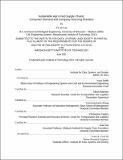| dc.description.abstract | Agri-food supply chains link food production to processing, trading, distribution, and consumption across the globe. However, food production can have severe environmental and social impacts. Rising societal awareness of issues regarding supply chain sustainability both promises opportunities for and assigns responsibilities to companies involved in the supply chain. Companies may seek to win new customers by selling certified sustainable goods. They may also implement other sustainable sourcing practices (SSPs) besides certification to manage their suppliers’ sustainability performance. This dissertation presents three studies that address some knowledge gaps about consumer demand for certified sustainable products and companies’ sustainable sourcing practices, with new findings drawn from large-scale, real-world datasets.
While survey-based research indicates that consumer demand for certified sustainable goods is large, this is not reflected in actual market demand. This gap suggests that either the demand predictions were incorrect, or that the marketing strategies used in the real world failed to tap into the potential demand. The first and second studies of this dissertation (Chapter 2 and 3) evaluate different marketing strategies by examining the actual market demand for certified Fair Trade and organic coffee based on consumer purchases at grocery stores across the US. Both studies use discrete choice models with random coefficients to characterize consumer demand in terms of consumers’ willingness-to-pay, price sensitivity, and substitution behavior.
The first study compares the demand for Fair Trade, organic, and dual-label Fair Trade and organic coffees, focusing on consumers who bought some certified coffee (9.3% of all coffee consumers). In aggregate, consumers (i) preferred products that were both Fair Trade and organic to products that were only Fair Trade or only organic, and (ii) showed equal preference between single-label Fair Trade and organic products. The results encourage companies that are choosing between the labels to invest in both Fair Trade and organic labels instead of just one.
The second study compares consumer demand for premium-priced and regular-priced Fair Trade and organic coffees relative to conventional (unlabeled) coffee. The study found that consumers were more sensitive to the prices of both premium and regular certified coffee than to the prices of their conventional counterparts. Even consumers who spent most of their coffee budget on premium certified coffees were more likely to choose the regular conventional category over the regular certified category in response to an increase in the price of their preferred premium certified coffee. Companies making and selling certified products would need to do more than matching prices and using sustainability certification labels to increase their market competitiveness in a traditional retail setting dominated by conventional products.
Companies want to know what SSPs other companies are using to inform their own strategies. Stakeholders, such as governments and non-profit organizations, need to know the prevalence of different SSPs used by companies in multiple supply chain stages to understand the development of sustainable supply chain in an industry. The third study (Chapter 4) addresses these knowledge gaps by examining the mixes of SSPs used by 171 companies in the palm oil industry. The study determined how “hands-on” or “hands-off” the companies are, and how the companies’ SSPs depend on their supply chain stages—retailers, manufacturers, or processors and traders (PTs). Hypotheses about the relationship between companies’ SSPs and their supply chain stages were based on theories commonly applied in sustainable supply chain management. Regression analysis was applied to data on companies’ SSPs collected from their websites and reports in 2018. The two most popular practices were certification and supplier code of conduct. On average, companies used two hands-off practices regardless of supply chain stage. In contrast, companies used fewer hands-on practices on average the more downstream their supply chain stage was, decreasing from PTs, to manufacturers, and then to retailers. The variations agree with what is expected from theory. The results highlight the prevalence of hands-off practices and that the PTs likely lack hands-on support from their downstream customers. Stakeholders are recommended to collaborate and invent solutions that can provide more support to PTs and more upstream suppliers. | |
